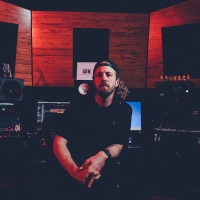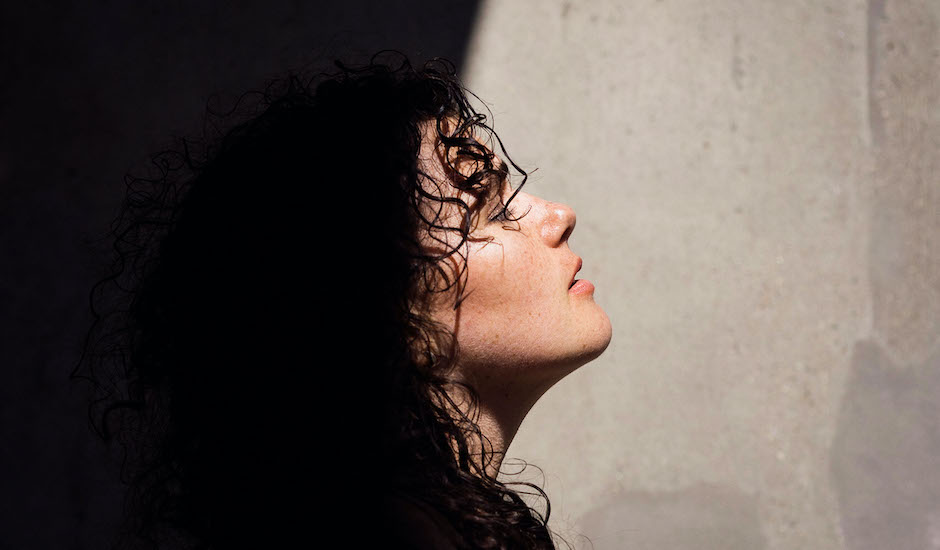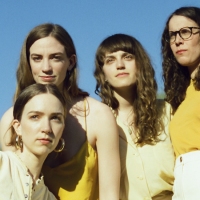 Setting up with Shockone: An exclusive look at his new live showDebuting exclusively to this year’s Origin Fields, one of Perth’s essential electronic musicians is saddling up for the biggest performance of his life.
Setting up with Shockone: An exclusive look at his new live showDebuting exclusively to this year’s Origin Fields, one of Perth’s essential electronic musicians is saddling up for the biggest performance of his life.

How GEORGIA sought thrills - and then hope - on the dancefloor
On her second album Seeking Thrills, the London musician returns feeling more empowered and ready to dance than ever.
Header image and in-article image by Joseph Connor.
GEORGIA has always had a close connection to the dancefloor.
Born Georgia Barnes in the midst of the early-90s British electronic explosion that gave us The Chemical Brothers and Fatboy Slim, the curly-haired London musician has always found herself surrounded by the catharticism of dance music, regardless of whether it was in the clubs she found herself in as a teenager, or at home with her family (her father is Neil Barnes, one-half of legendary UK electronic duo Leftfield). She, like many others, has grasped at the sense of belonging - and perhaps destruction - that dancefloors can bring; the thumping club culture of London’s underground a place of therapy just as much as they are places of alcohol, dancing and regret.
It would be a surprise then, to learn that Georgia’s debut album, her 2015-released self-titled, would only a small amount of these sounds. Although rooted in clear-cut electronic influence, the record - “artful and unschooled,” The Independent called it - allowed her to inject subtle and often cinematic electronica with mannerisms from here, there and everywhere: glitchy breaks, snapping hip-hop percussion, and dancehall’s stepping rhythms a start. It felt, at times, more like a record built upon the productions you’d find underneath rap’s biggest then-stars, rather than a solely ‘dance music’ record.
Despite that, the record was a big moment for Georgia. She was thrown into the deep ends of fame: once only recognised as a backing musician for performers including Kate Tempest and Fever Ray, Georgia was now being thrown into the dizzying, ‘no lessons taught’ chaos of being in the limelight, something she was largely yet to experience. “It was quite a difficult period for me,” she reflects, talking from her London home where she’s spending a low-key few weeks before Christmas and then, in the new year, the release of her second album. “A lot was happening in my personal life at the same time too,” she continues.
Confronted with the strangeness of fame and a crumbling personal life, it didn’t take long for Georgia to stumble into self-destructiveness; she didn’t value herself, she says, even when the world was beginning to value her. She quickly turned to clubs, and the chaos - the alcohol, the drugs - they bring as a sense of escape, finding herself within the spiralling techno and pacing house that she felt familiar with from her introductions to dance music.
Five years after her debut album, Georgia emerges out of the other side completely revitalised. She’s now sober, and one of those people that keep their personal health at the forefront of their minds - a difficult feat, as a touring artist. She owes it to the same dance music culture that welcomed her destructive decline of self-consciousness, but in a different light: A culture built around inclusivity and comfort; one that amplifies you for who you are, and encourages self-expression. Club culture at its best is a place that allows people to be themselves, in a way that they may be unable to outside of the smoke-lit dancefloors that Georgia found her comfort in.
It would make sense then, for Georgia’s second album - Seeking Thrills, out January 10th - to be an album that celebrates the culture that rebirthed her and brought her back to self-acceptance and self-value. It’s a record built around the dancefloor and its therapeutic presence in Georgia’s road to self-discovery; her highs and lows mapped out across a record that ebbs and flows alongside. At times, it’s painful with its rawness - Till I Own It aches with a desire to fit in amongst a new city - but mostly, it's euphoric; the shadings of darkness reworked into bold melodies and fist-clenching choruses in the same way that Robyn has so expertly mastered.
Musically, Seeking Thrills focuses on the bold; taking the subtleties of her self-titled’s electronica and putting them on full blast. About Work The Dancefloor, a strong album highlight, moulds hammering synths not too far off those on Robyn’s Dancing On My Own with twinkling melodies and repeated choruses so heavily distorted they almost feel robotic in a perfect example of Georgia’s sonic growth since her self-titled. Meanwhile, songs like Never Let You Go and 24 Hours lose themselves - in a good way - amongst their heavily-layered melodies; the latter song a song about losing yourself at Berlin institution Berghain.
It’s a record built from the dancefloor for the dancefloor; the catharticism of letting yourself go and being authentic shining through the record’s aching pulses and dizzying percussion. It’s a hard feat to do - musically building this freeing sense of self-belonging in late-night spaces - but somehow, Georgia has done it.

I wanted to start by talking about the time that immediately followed your debut album back in 2015, because from what you've said in the past, it sounds like you were almost thrown into the deep end with it - thrown into the unfamiliarities of fame, and so on. How does it feel looking back to it now, in a position where you're about to do it again?
It was quite a difficult period for me because a lot was happening in my personal life at the same time too, and it was such an interestingly strange moment in time where I found myself almost out of control with certain aspects. I just don't think I really valued myself. I think I was just so in the moment being like, "Oh my god, I'm signed but my family is falling apart" and I think I made the mistake of constantly going out and drinking; not really loving myself and being a bit out of control. It felt really horrible for about a year or so, and then I 'woke up' one day from that bad period and decided that I'm gonna change my life: stop drinking; try to get fit; lose weight; change my diet and get into nutrition.
That's really what I did during that transition period, in the midst of writing this album. This record is really inspired by this transition, and turning around my life. These songs reflect the transition period for me, from being a young, somewhat destructive 20-year-old to a bit more of an adult.
Did writing an album about this time and everything it encompassed feel like the natural thing to do in your life coming out the other side of it?
No, I don't think I set out to really write an album about it. I think it naturally just happened. When you're in the process of creating, I don't sit down beforehand - and certainly not for this record - and be like "Okay, I'm going to write about this, and this, and this." I didn't come into this wanting to write a record about the transition from an out of control young person to who I am today. I think I just began the process; I wanted to begin the process a clear mind of such. Doing these interviews actually, in hindsight, I look back and I say, "wow, these songs really do reflect that kind of personal journey I've been on, as well as this idea of seeking thrills." In the end, I think I just trusted myself and pushed myself and these are the songs that came out really.
I was reading that something you found comfort in across this time was clubs, club music and how they can be places to heal, rather than just drinking and forgetting stuff the next day. About Work The Dancefloor is a single that really touches on that.
Absolutely, yeah. Club culture has been a big part of my life since I was a child in fact, with my father being in an electronic act [UK duo Leftfield]. We were brought up amongst the idea of club culture being not only this kind of hedonistic space, but also space where people's lives could be changed. Throughout my late teens when I went clubbing for the first time, I was really on that hedonistic trip, you know? I just wanted to go and take drugs and experience that kind of heaviness clubbing can bring, but during this transitioning moment of not drinking and not doing recreational drugs, I did go to these clubs and I had a completely different experience. It really opened my eyes to the fact that these places are so important for people to have freedom of expression and not feel like you're under any constraints.
It was almost like I was researching for this album, and instead of being the one participating, I was the one on the outside observing while also trying to have a bit of a personal journey. It was a different way of experiencing this kind of club culture and dancefloor culture, and I really met such incredible people that were also sober and not doing recreational drugs. It soon dawned on me that just how important these aspects of club culture is to these people. Dancefloors are so important to people.
This album feels a lot more house-ier - a lot more club-centric sound-wise - to your debut. Do you think that's perhaps a byproduct of this album being conceived on the dancefloor?
Yeah, totally. I got completely obsessed with going back to the originators of dance music - obviously the origins lie a lot older than the 80s, but particularly how techno's early start is really in the early 80s. Focusing on the music, that [period of time] is where I looked to and that gave me a direction on the production on the songs. I wanted to explore the basslines and the synths and the lyrics and the vocals of that era of music, because I felt like they had such an impact on popular music particularly in the 80s, and of course, now. When you hear the mainstream charts, there's a lot of dance-built pop music which comes from the 80s period in Chicago. Music became much easier to produce because of technology, people were able to set up DIY studios in their bedroom, and it was really the era of where the people began to make music, rather than this idea of having to be in a certain background or from a certain sort of thing to become a musician and an artist - they really broke down that sort of boundary.
I think it was just such a fascinating period in American history as well, because especially in Chicago, it was a very segregated community - it still is, but particularly then. If you were black, gay or whatever gender you identified with or whatever colour you are, if you were on the fringes of society, house music provided a community for you and really, it became more than just the music scene - it was a complete cultural home to people. That power of the music and of the scene was really influential to me, and I think a powerful message in general really of inclusivity.
So, I started to go to the DJs that I really love to see like The Black Madonna. She basically says this famous message again all these years later: on the dancefloor, you can be whoever you want to be. We love everyone and we don't care about what you look like or what you identify with; it's just about feeling free and happy. I think that message now is really important, especially with what's going on in the world. It just kind of really affected me, both emotionally and even physically with making the sound of this record.
This album comes with a lot of musical comparatives to Robyn, and she's someone who brought a similar story with her latest record: "Club culture has always encouraged people to come together in a space where they can be themselves and explore things that they might not be able to explore in other places." That sounds very similar to your experiences to club culture, and what you've depicted on this record.
She's completely right. I don't think any other music scene really does that as well. I think a young girl going to maybe a Billie Eilish concert may identify with this amazing girl who's wearing not your traditional clothes but it's very much like a personal experience, whereas I think a dancefloor is a place where people totally come together and have this kind of collective energy that's very powerful. I'm not trying to say that people don't feel that when they go to the music that they love to go and see - I think there is a strong argument for all types of music - but I do think there is something about dance music that does break down boundaries unlike any other form of music, and that's why it's survived as long as it has and why it's had the most impact I came on a lot of artists like Robyn. I think a lot of female artists find this energy in the dancefloor.
The Black Madonna, who we were talking about earlier, being another one that champions this.
When I started working with Maria - The Black Madonna - we quickly became very good friends. To me, it was a really interesting moment in my life because I had learnt so much about Chicago house music and when I met Maria, I just wanted to ask her so many things about Chicago and what she felt about it. It was a really amazing moment of becoming close to her, it felt really personal to me.
One thing I did want to talk to you about is the London club space because it's been a little bit turbulent over the last few years. There was a time of mass closures - Fabric closing, for example - but plenty of new things have popped up since, like Printworks, which are bringing life back to it. I know you're someone who has been present in London club culture for a long time - like you've said - so I'm curious to hear how you think it's changed.
It's quite a hard subject to talk about in a short space of time because it's so complicated what's going on in London. The point is, that where there are people who love to dance, there are going to be clubs and there are going to be nights.
The thing is about London is that it's huge. There are so many kind of creative spaces that are opening that have all sorts of people taking over these spaces and bringing new life to into the spaces. I think at the moment, it's a really creative time if you're into event organizing. However, it's also a very complicated time because you have to go through so many new loopholes in codes and conduct. It is very expensive now, and that locks out a lot of the underground space from becoming something big, and people from disadvantaged backgrounds from doing their thing. There's a lot of challenges one faces when putting on an event like a rave. I guess you could say we're almost in this kind of early 90s period again: clubs have closed - there are only a few clubs now that are open in London and worth going to - but what you have is the emergence of illegal raves again, which is really cool.
There's a lot of groups - collectives. People are more likely to go to these collective-held parties, like a Krankbrother party - which is a big one where they do street parties around London which is really cool. But in it comes terms of the actual clubs, there are few now that are worth going to and that is a shame but people are wanting something a bit more real. People are wanting something a bit more kind of creative, and I guess that comes from parts of Europe.
Georgia's new album, Seeking Thrills, is out via Domino Record Co on January 10th - grab it here.
Follow GEORGIA: FACEBOOK
 Setting up with Shockone: An exclusive look at his new live showDebuting exclusively to this year’s Origin Fields, one of Perth’s essential electronic musicians is saddling up for the biggest performance of his life.
Setting up with Shockone: An exclusive look at his new live showDebuting exclusively to this year’s Origin Fields, one of Perth’s essential electronic musicians is saddling up for the biggest performance of his life.
 Meet The Big Moon, the UK band mixing politics and pop musicAfter the runaway critical success of their debut, the UK four-piece are back with an album built for the chaos of worldwide change.
Meet The Big Moon, the UK band mixing politics and pop musicAfter the runaway critical success of their debut, the UK four-piece are back with an album built for the chaos of worldwide change. 